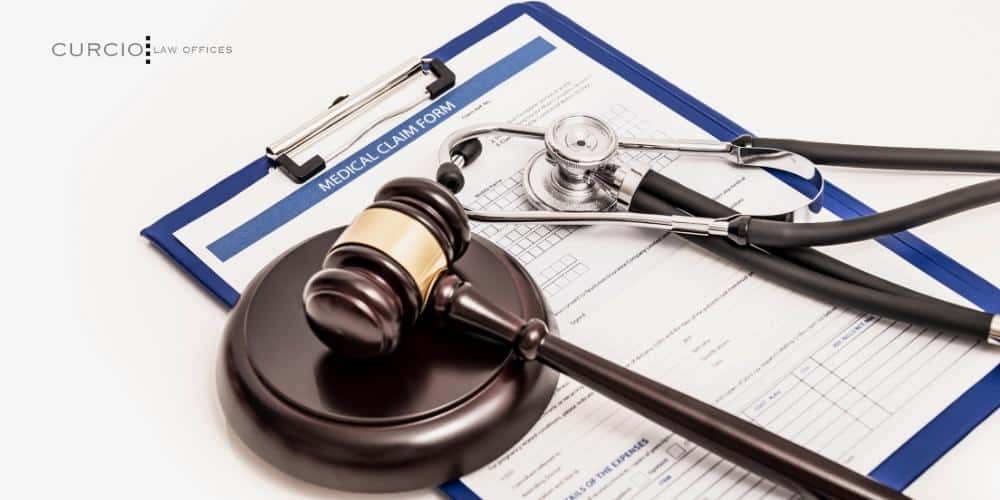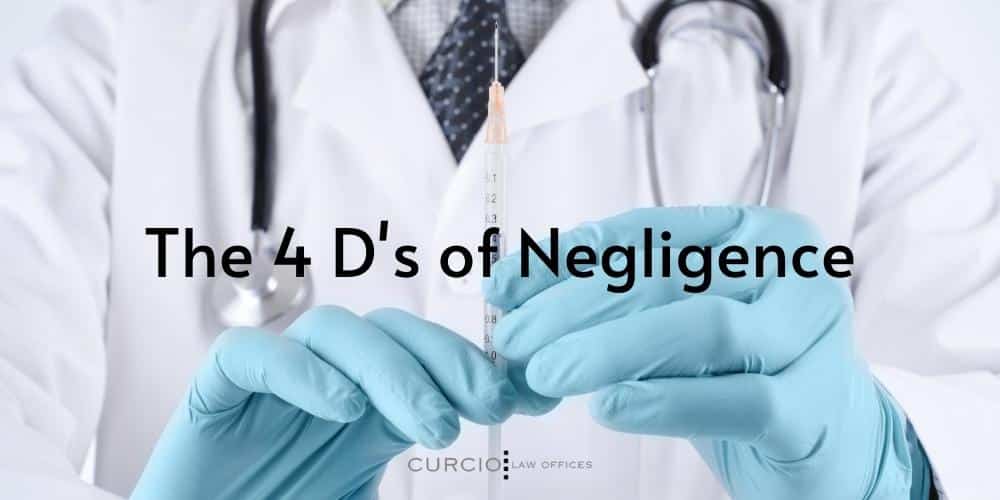Regardless of whether you’re injured in a car accident, work-related accident, or even if you’re just accident-prone, when a person seeks help from a healthcare professional, adequate care is what we assume we will get. After all the hospital bills, medical expenses, and surcharge hidden fees, expecting a certain level of care as a patient isn’t a lot to ask. Unfortunately, sometimes a healthcare provider falls short of adequate standards of care for patients. But, this doesn’t always mean that the victim has a valid medical malpractice or medical negligence claim. A medical negligence case arises only when a healthcare professional’s action or inaction exhibits the 4 d’s of negligence.
But what exactly are the 4 d’s of negligence?
If you’re questioning whether or not you have a valid medical malpractice claim but aren’t quite ready to call yet, our experienced Chicago medical malpractice attorneys have put together this “4 d’s of medical negligence guide” to help clarify the specifics of medical malpractice claims in Illinois.
The Duty of Care
All medical experts, doctors, and nurses tasked with treating patients have an obligation to care for the patients. The responsibility of any healthcare provider is to provide medical assistance that meets the accepted standards of care. This is called the duty of care.
Duty of care is the first element in every medical negligence claim.
Our experienced medical malpractice lawyers must prove to a jury that a doctor-patient relationship was established between you and the defendant. Out of the four d’s of medical negligence, this is the easiest element to prove.
An established relationship simply means that you, the patient, sought help from the medical practice, and the doctor willingly accepted you as a patient. Upon the acceptance, the doctor also accepts the duty of care to treat you within the proper standard of care.
We can establish that a doctor-patient relationship existed by exhibiting medical records of doctors’ visits.
Duty Dereliction
The second element for a valid medical negligence claim is duty dereliction or deviation from the standard duty of care.
As we mentioned, when a healthcare professional agrees to accept you as a paying patient, they inherently accept a duty of care.
However when the doctor or healthcare professional fails to provide medical treatment that meets the expected standards, this is duty dereliction or duty deviation.
But, what is the expected standard and how does a medical malpractice lawyer prove deviation?
In order to prove deviation, we’ll compare your physician’s actions with the standard actions of any physician in the same field of medical practice under the same or similar circumstances. If your physician’s actions differed from the actions that a reasonable person in the same field would take, this is deviation.
In most cases, the greater the deviation, the greater the likelihood of negligence, and therefore the better the chances of a valid claim.
Our Chicago medical malpractice lawyers will prove that the healthcare professional deviated from the standard duty of care by calling expert witnesses and other medical professionals to validate your claim.
When proving a healthcare professional deviated from the standard duty of care, one must provide evidence of the following:
- Any practicing physician or healthcare professional presented with the same circumstances would have acted differently.
- The medical professional did not work in compliance with the best practices in their field.
Medical negligence claims are all unique. Some cases present a greater challenge, in terms of proving medical negligence and deviation from the standard duty of care.
It’s important to note that simply having an unsuccessful outcome is not enough to file a successful medical negligence claim. If the doctor’s treatment recommendation is within the same line of appropriate care, the doctor cannot be held liable for your injuries.
Direct Cause
The third element of a medical malpractice claim is causation.
Your medical malpractice attorney must prove that the medical provider’s negligence was the direct cause of your injuries.
When a healthcare professional’s negligence is involved, your injury can manifest:
- As the need for more medical treatment
- Unexpected or unreasonable complications
- As a medical condition that worsens after treatment
Obviously, healthcare providers don’t cause the initial injury or existing medical condition. However, their actions or lack thereof could negatively affect a patient’s prognosis as a direct result.
The Burden of Proof for Negligence
The burden of proof for direct causation falls on the victim or plaintiff.
So, your attorney must prove that the:
- Medical professional owed you a duty of acceptable care.
- Medical professional failed to provide an adequate level of care.
- Deviation is the cause of your injuries.
Proving causation is more challenging that you’d think.
All surgeries carry potential risks. Sometimes when healthcare professionals provide the best possible medical care, complications can still occur. This creates a gray area for the defendant’s lawyer to create doubt.
Furthermore, every medical malpractice case must be proven by a preponderance of the evidence. So, a jury must be convinced that the defendant’s deviation from the standard procedure most likely caused your injury.
Now, let’s look at the defendant: someone undoubtedly within the medical industry. In many cases these healthcare professionals will be represented by the hospital’s on-retainer defense lawyers.
Hospitals devote an unfathomable amount of resources to protect themselves and their employees. So, in order to have a favorable outcome in your medical malpractice case, you must select a Chicago personal injury lawyer that not only has the experience to prove causation but also who has the backing of an established law firm to float the case.

Damages or Harm to the Victim Caused by Negligence
When a patient is injured because of a medical professional’s negligence, he or she deserves to be compensated for losses incurred.
These losses fall into three separate categories:
- Economic damages
- Non-economic damages
- Punitive damages
Once we’ve established an attorney client relationship, our experienced attorneys will fight for maximum compensation for your losses.
What are Economic Damages?
Economic damages are the quantifiable costs incurred as a result of your injury.
When a patient suffers and brings a valid medical malpractice claim, the economic damages will range, depending on the level of severity and surrounding factors of the claim.
Examples of economic damages include:
- Present and future lost wages
- Cost of medical treatment, including future medical costs
- Loss of employment due to injuries
A compassionate medical malpractice lawyer at Curcio & Casciato will help you and your family recover economic and non-economic damages through your medical malpractice claim. If you or your loved ones have been affected by medical negligence, call for a free consultation with an attorney of Curcio Law.
What are Non-Economic Damages?
Non-economic damages are generally not “measurable.” While these losses don’t have a monetary value, victims of malpractice still deserve to be compensated.
The non-economic damages associated with a medical malpractice lawsuit include but aren’t limited to:
- Pain and suffering
- Loss of consortium
- Disfigurement
- Emotional distress
Trauma can affect a victim for the rest of their life, and some victims of medical negligence may never heal correctly. The experienced personal injury lawyers at Curcio Law will help you receive full and fair compensation for your medical negligence case.
What are Punitive Damages?
The state of Illinois allows medical negligence victims the opportunity to receive punitive damages. The courts award punitive damages when the defendant displays malicious or harmful behavior.
When a court awards punitive damages, in essence, the defendant is made an example of. Punitive damages are a way to prevent heinous and extremely negligent acts.
Punitive damages are considered in the following types of cases:
- Catastrophic injury cases
- Wrongful death cases
- Cases in which the defendant exhibits extreme neglect or malicious intent

Experienced Chicago Medical Malpractice Lawyers
If you or a loved one suffered an injury due to medical negligence, whether this is from a wrong medication, delayed diagnosis, surgical error, etc., our lawyers are here to help.
Our experienced Chicago medical negligence lawyers at Curcio Law have years of experience navigating through the 4 d’s of medical negligence and filing successful claims on behalf of our clients. If you need a passionate personal injury lawyer who genuinely cares for your family’s needs, call us for a free consultation.



